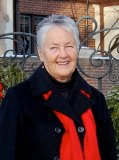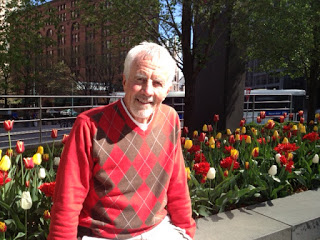to mind theater acting or perhaps movie acting.
I, however, briefly considered delving into a deeper subject. I always have been fascinated with human
minds, and I have been aware that people often put on acts in front of others
throughout their daily lives. William Shakespeare wrote, “All the world’s a stage, and all
the men and women merely players.”
greatly from person to person depending upon his perceived situational needs
and depending upon his own nature. I,
for example, don’t care to engage in artifice; I’d rather be just who I
am. Acting takes too much effort, and
perhaps I’m just too simple-minded to be clever at it. Others, however, are like chameleons, saying
and doing anything and everything they deem necessary to attract and influence
other people. An extreme example of that
is the last three (especially Republican) presidential primaries. Many people enthusiastically succumb to such
manipulation, but I am repulsed by it.
repulsed and spending time talking about the vagaries of human nature, I’ll
return to the more enjoyable subject of theater acting. Here are a few snippets of theater
occurrences from my early days.
play was at age seven. My elementary
school was run by the local university, which provided student teachers with an
opportunity to practice by assisting the regular teachers. One young lady wrote “The Marshmallow
Mushroom.” I was an elf name
“Muffin.” I was a very competent
elf. I enjoyed the experience and still
have the script secreted somewhere with all my keepsakes.
university was celebrating the sesquicentennial of its founding, and they had
commissioned Alan Smart to write an historical play called “The Green
Adventure.” I played a pioneer lad. Ever since that time, I never have looked at
the script, but I have that one, too.
the infamous genre of high-school plays.
The usual botches and glitches occurred in all of them: forgotten lines,
mixed-up scenes, stiff acting. I was
sufficiently unimpressed with our productions to remember them today.
what happened to my oldest brother. That
class put on the famous “Annie Get Your Gun.”
My brother was cast as Buffalo Bill.
The problem was the audience never did figure out who he was. That is because the lead actor totally forgot
his first-act lines and kept repeating the lines from the end of the second act
to the point where the rest of actors just went ahead and skipped half the
play. So by the time my brother wandered
onto the stage wearing a cowboy hat and a quizzical grin, no one knew who he
was. That role did not lead my brother
to a career in Hollywood.
destined to become my brother’s wife was participating in a high-school play in
Katonah, New York. They were performing “Arsenic and Old Lace.” As you recall, the
loony brother who thought he was Teddy Roosevelt always assumed the responsibility
of taking the supposed “victims of yellow fever” to the basement to be
buried. The stage was built three feet
above the main floor of the auditorium, and a trap door provided access to the
space beneath. The play director
decided, having no stairway to a basement that the trap door would suffice as
the apparent entrance to the basement.
Of course, when “Teddy” dumped his victims down into the basement, they
had learned to bend their knees to simulate descending into a deep
basement. During the first act, the trap
door was covered with a carpet. The
problem was that, during the first act, the carpet was there, but someone had
forgotten to replace the trap-door cover.
So in the midst of the first act, an unsuspecting student-actor walked
across the carpet and immediately slowly sank three feet down into the floor
where he remained standing, torso and head above the floor, and wearing a very
surprised expression. Fortunately the
play is meant to be a comedy, however, the howls of laughter from the audience
came at an unexpected time.
one play as a college freshman. The
theater department had a good national reputation, so I thought that I would
see what it was like. I played the
servant “Mishka” in “The Inspector General.”
I don’t recall seeing any mention of me in any newspaper rave
reviews. Apparently, I didn’t have the
immediately recognizable attributes of stunning stature, handsome looks, and
captivating voice to merit much attention. The young stud who starred in “The Fantasticks”
was a corn-fed Kansas boy whose natural talent and good looks guaranteed the
role, even without any prior experience.
Apparently, I was destined to play character roles such as servants,
extras, or just one of the elves.
that I sentimentally recall. Although I
never had the pleasure to be in it, I saw a wonderful production of it by my
university theater department and, later when I arrived in Denver, by the young
students at Arapahoe Community College.
The play was “Dark of the Moon,” a folk-play about simple back-woods
people living in the Smokey Mountains.
Although the theme and setting may seem too antiquated for these modern
times, it was remarkably popular for many years from the 1940s through the
1970s, so much so that up-and-coming actors such as Paul Newman eagerly wished
to be part of the play.
that “John Boy” fell in love with “Barbary Allen,” a beautiful girl previously
never seen in those hills. It turns out
that she is a witch-girl with no soul and who lives three hundred years, after
which she turns into Smokey-Mountain mist.
Of course, the story has love, rivalry, and tragedy. There also were occasional scenes at the
general store with the old folks sitting around the pot-bellied stove with
their musical instruments and singing Appalachian ballads that coincided with
the story. I became so fond of the story
that I bought the script to read, twice, once because I loaned a copy to a
friend who failed to return it.
dotage, I recall “Dark of the Moon” with sardonic humor. That is because I recall the youngsters of
Arapahoe Community College doing their best to imitate the elderly, they
themselves never having experienced the stiffness, pain, and other afflictions
of old age. They did their best, but
somehow, they just did not look convincingly old. And, I don’t think that additional experience
acting would have made any difference.
not brought me I have had a life-long fascination with people and their life
stories. particular fame or fortune, I
too have had some noteworthy experiences and, at times, unusual ones. Since I joined this Story Time group, I have
derived pleasure and satisfaction participating in the group. I do put some thought and effort into my
stories, and I hope that you find them interesting.




